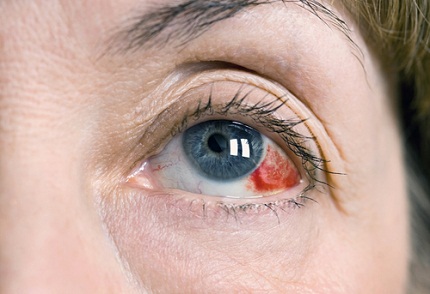 New Health Guide
New Health Guide
When a tiny blood vessel ruptures underneath the conjunctiva or the transparent surface of the eye, it is called subconjunctival hemorrhage. Since the conjunctiva cannot absorb the blood rapidly, it remains beneath the surface for longer duration. Although it seems worrisome, it is usually harmless and disappears within one or two weeks. It could be caused due to strong sneeze or cough which ruptures the blood vessel.
 It is not very clear what causes subconjunctival hemorrhage; however, the following might cause rupture of small blood vessels in the eye:
It is not very clear what causes subconjunctival hemorrhage; however, the following might cause rupture of small blood vessels in the eye:
Strain can cause rupture of blood vessels due to sneezing, coughing or vomiting. Heavy weightlifting or strenuous exercise can also cause blood vessels to burst.
An external factor like bump to the eye or being struck with any sharp object can cause blood vessels to burst.
Diabetics can suffer from eye disease which causes the blood vessels to rupture and this can cause loss of vision in the eye. To avoid this situation, diabetics should routinely get their eyes checked.
When the blood vessels in the eyes retain more blood than normal, they swell and causes red eye. This can occur due to glaucoma, fatigue, allergic reaction, infection or any other serious disease. Doctors should be consulted if the person experiences pain, loss of vision, clouded cornea or discharge from the eyes.
A condition called hyphema occurs when blood appears between the cornea and the pupil. It can lead to glaucoma, which will mean loss of vision. Immediate medical attention should be sought when this happens.
High blood pressure is the most common cause of blood vessels rupturing in the eyes. Other problems which cause this are heart attack and strokes. It is important to keep blood pressure under control by eating healthy diet and maintaining a regular exercise routine in daily life. Supplements containing garlic, hawthorn or folic acid can also be taken after consulting a doctor.
Coughing and sneezing are involuntary actions and cannot be avoided. However, when they are excessive, a doctor should be consulted. In case of cold, take vitamin C, cough medicine or medication to reduce symptoms of cold.
Treatment is not actually required for subconjunctival hemorrhage; however, medications can be taken for pain or discomfort. Aspirin should be avoided for causing blood thinning. People already on blood thinners should check with doctor if they can continue with the medication. Artificial tears can be helpful in preventing irritation. If the hemorrhage has been caused due to trauma, other medication can be required for healing process. In case of infection, antibiotic eye drops may be prescribed. Else, it should heal on its own within two to three weeks.
If the hemorrhage does not heal within two weeks, an ophthalmologist should be consulted. If you experience subconjunctival hemorrhage in both eyes simultaneously, or if it occurs with bruising, bleeding gums, etc. you should immediately inform the doctor.
If the subconjunctival hemorrhage occurs along with the following symptoms, you have to consult the doctor immediately:
It is not possible to prevent a blood vessel from bursting in the eyes; however, following are some preventive measures that can be helpful.